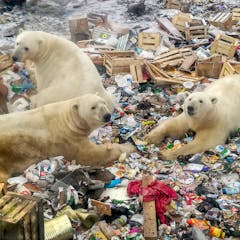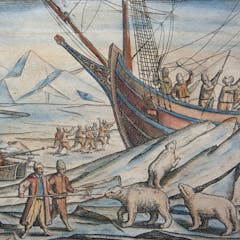
Articles on Polar bears
Displaying 1 - 20 of 32 articles

Image of the majestic creatures remain powerful communicators of humanity’s connection with nature.

Avian influenza has killed a polar bear and may have infected other bears.

Researchers have made a fascinating observation: a polar bear used a diving hunting technique, never before reported, to capture large moulting snow geese.

Not all animals retreat to their shelters in cold weather.

We need to understand how bears are affected by climate change, and how those stresses might create new risks for humans.

Climate change has affected food availability for polar bears, which can impact polar bear mothers’ ability to lactate.

Comparison of modern and archaeological polar bears indicates that four millennia of food web stability has been disrupted by modern climate change.

Toxic synthetic chemicals, called PFAS, are a serious threat to humans and wildlife – but many people are unaware of them.

Polar bears and wolves may get the glory, but small predators like weasels, foxes and their cousins play outsized ecological roles. And many of these species are declining fast.

Polar bears are increasingly seeking sustenance in human trash because of melting sea ice and a loss of hunting opportunities. The result is a rise in human-bear conflict – and dead bears.

International proposals to ban the trade of polar bear parts undercut Inuit rights, knowledge and decision-making.

This seemingly one-off heatwave may be a harbinger for the future under climate change.

Polar bears are being forced to adapt their feeding habits due to climate change – so reports of summer scavenging, foraging and terrestrial hunting are unsurprising.

Do you see a fearsome predator? A fragile icon of impending extinction? What these arctic giants have stood for in art has continually evolved.

This is the oldest genome recovered from a non-permafrost environment.

This is the story of ‘Misha’, as I have come to know her. Both I and my research have been deeply affected by a polar bear I have never met face to face.

Emperor penguins have a few hidden tricks to stay warm, like blood vessels in the nose arranged so they can regain most of the heat that would be lost by breathing.

Polar bears ‘invading’ a Russian village have renewed concern over climate change in the Arctic, but human-wildlife conflicts are flaring up everywhere.

Never before have grizzly bears, black bears and polar bears been found living in the same place.

Climate change is shrinking Arctic sea ice and opening the region to ship traffic. Whales, seals and other marine mammals could be at risk unless nations adopt rules to protect them.
